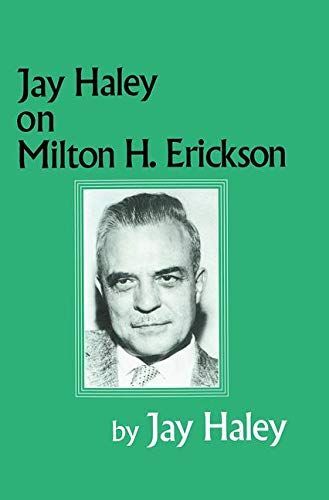
Jay Haley on Milton H. Erickson
Never before has a volume so masterfully illuminated the monumental contribution of Milton H. Erickson to the fields of hypnotherapy and psychotherapy. Written by Jay Haley, renowned therapist, teacher, and author, this eclectic collection of articles will engage readers with its fascinating mosaic of fact, observation, anecdote, and commentary. Few individuals are better able to convey a sense of Milton Erickson and his work than Jay Haley, who studied with Erickson for 17 years. Erickson's Contribution to Therapy - a chapter by Haley, is rich with perceptive insight and is very likely as close as we will ever come to capturing the essence of this complex and enigmatic individual. The first chapter provides a succinct biography of this extraordinary man. Readers will learn how Erickson overcame numerous adversities early in life, and how these events shaped his development as a highly innovative thinker. They will learn of his bold and unorthodox style. Erickson was far before his time and deemed an outsider for his views of hypnosis and brief therapy. Now, more than a decade after his death, his influence and advanced ideas are being given their due importance. Commentary on Milton Erickson, M.D. examines the practical and theoretical aspects of Erickson's methods, including his therapeutic posture, expectation of change, emphasis on the positive, acceptance of what the patient offers, acknowledgment of more than one solution to a problem, blocking of symptomatic behavior in relation to the therapist, use of anecdotes, and willingness to "let go" of patients. A Review of Ordeal Therapy focuses on a controversial therapeutic technique successfully used by Erickson. Haley cautions the reader, however, of the care with which this powerful technique should be exercised. A fascinating dialogue between Jay Haley and John Weakland, Remembering Erickson provides readers with irresistible anecdotes about Erickson the psychiatrist and Erickson the man. Of singular significance to most therapists today is the issue of short- versus long-term therapy. In Why Not Long-Term Therapy? the author examines this issue and its ramifications in relation to Erickson's beliefs, including the concept of charging by relief of the symptom. In a particularly fascinating article, Haley explores the many characteristics of Zen that are relevant to Ericksonian psychotherapy. This is followed by the verbatim text of a hypnotic demonstration conducted by Erickson in 1964, which also includes Erickson's own commentary about it several years later, as well as an analysis by Haley. The volume concludes with Typically Erickson, a paper celebrating and offering new insights into the artistry of this original thinker.